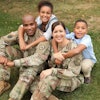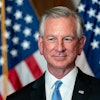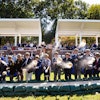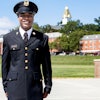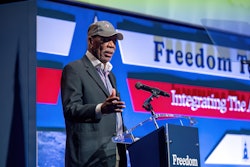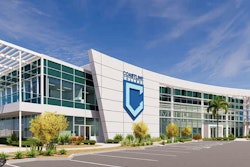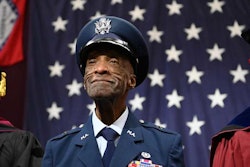Around 550 Navy, Marine Corps and Coast Guard service members began classes virtually this week as part of the United States Naval Community College (USNCC) pilot program.
The idea for the community college was first announced in 2019, after the “Education for Seapower” study recognized how education could improve “operational readiness” and “warfighting capability” among enlisted service members, according to Dr. Randi Cosentino, USNCC’s president.
 Dr. Randi Cosentino
Dr. Randi Cosentino“[The program can] really help individuals who are committed to lifelong learning,” she said. “Taking on their education both within their time in the service and beyond, while kind of keeping them in naval traditions and values, ethical decision-making ability, improved critical thinking, ensuring they have a deeper understanding of the environment in which they operate.”
The program’s main areas of study include naval ethics, the nuclear field, cyber security and data analytics.
Enrolled students also take general education courses offered at partnering schools: the University of Arizona, Northern Virginia Community College (NOVA), the Univ. of Maryland Global Campus, Alexandria Technical and Community College in Minnesota and the State University System of New York (SUNY Online).
“We are excited about this pilot and the opportunity it brings with it,” said Dr. Chad Knights, NOVA’s provost of information and engineering technologies. “This further establishes that NOVA, and the Virginia Community College System of which we are a part, are high-level education innovators and collaborators on a global scale. We look forward to the future partnerships with the USNCC.”
In general, USNCC aims to create pathways for military students to continue their education at a four-year institution, said college officials.
“All of this is a focus of in the here and now improving the military and the readiness of our forces, but also looking towards their own long-term development,” said Cosentino.
To offer more flexibility, courses range from six to 10 weeks and can be completed online throughout the day.
“As you might imagine, we are trying to serve a globally deployed force,” said Cosentino. “So, like many working adults, providing ease of access but in a supportive environment is critical. Online education is the exclusive modality that we will be using in order to provide the broadest access that we can.”
At NOVA, for example, 87 students are currently enrolled in the cybersecurity program courses. From there, students are placed into different tracks based on their skill levels.
 Dr. Chad Knights
Dr. Chad KnightsAccording to Knights, six of the current USNCC participants are previous or current NOVA students.
“We want them to feel that they have been supported and have achieved success through their dedication and hard work, and that they are now part of the NOVA family,” he said. “They should feel welcomed and know that this is a place where they can achieve personal success; and further down the line, we would like to see them continue their education in other NOVA programs towards a degree.”
USNCC plans to collaborate with the participating colleges to ensure students receive college credit for military training experiences.
The pilot program, which is set to run from January to June, will collect data to evaluate the impact of the online learning environment as well as overall student experiences and academic success.
With the goal of establishing a second pilot program next year, data will be used to make adjustments to the learning experience.
As part of its expansion to offer six or seven associate degree programs, the second program will increase its student population to around 5,000. Additional courses will be offered in organizational leadership and logistics.
The community college will work with the first cohort of students to help them transition into the next program, if interested.
Students also have the option to earn “stackable” certificates. For example, the Naval Corps Certificate focuses on topics such as naval ethics and leadership, military history, geopolitics and civilian-military relations.
Combined with general education courses, students can earn an associate degree.
As USNCC develops, Cosentino said the ongoing goal is to continue to improve diversity and remove areas of bias and prejudice within the U.S. military.
“We think education goes along in supporting that in terms of providing a really compelling opportunity to attract a broader set of individuals into the Naval services,” she added. And an additional goal is to “make sure” that in creating courses like naval ethics and leadership, USNCC is also “creating an environment that is supportive and values all individuals.”
Sarah Wood can be reached at [email protected].

